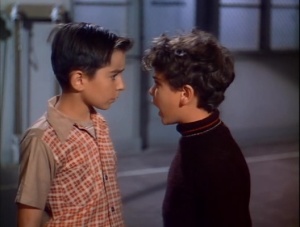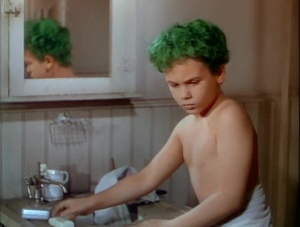The Boy with Green Hair 1948
Approved | 1h 22min | Comedy, Drama, Family | 12 September 1949 (Sweden)
Storyline:
This parable looks at public reaction when the hair of an American war orphan mysteriously turns green.
User review:
This film really touched me as a child. Firstly, it was the only serious film about a kid, with a kid as the star, that I had ever seen. None of this Disney stuff. Though later came the ‘5,000 Fingers of Dr.T’, another great film for youngsters. Secondly, it was about a child’s pain and inner life. There are a few platitudes thrown around by the wooden adults but the film seems to aim at exposing this kind of no-communication. It just isolates and abandons a youngster when they most need a strong and comforting adult connection.
Every time I see this film again it is just as good as the first time. Another interesting aspect of this film’s story is that although the boy has lost both of his parents during WWII, he has become stuck and needs to move on and incorporate this difficult time. And in doing so he becomes aware of the many WWII orphans everywhere and becomes able to identify himself with the many children who are in his own circumstances or worse. He doesn’t feel so alone. He finds that he truly cares about the suffering of other orphans and wants to do something to alleviate this suffering.
There! And I didn’t give away the ‘green hair’ thing. I have a collection of anti-war films- Glory-Three Kings-Courage Under Fire-Coming Home. I only need “The Best Years of our Lives’ and the ‘Boy with Green Hair’ to make it complete.
Director: Joseph Losey
Writers: Ben Barzman (screen play), Alfred Lewis Levitt (screen play)
Stars: Pat O’Brien, Robert Ryan, Barbara Hale
Country: USA
Language: English
Release Date: 12 September 1949 (Sweden)
Filming Locations: McKinley Home for Boys – 13840 Riverside Drive, Van Nuys, Los Angeles, California, USA
http://www.imdb.com/title/tt0040185/
Format : AVI
Format/Info : Audio Video Interleave
File size : 699 MiB
Duration : 1 h 18 min
Overall bit rate mode : Variable
Overall bit rate : 1 245 kb/s





























A Film With a Message Still Relevant Today!
My review of THE BOY WITH GREEN HAIR.
Colour by Technicolor.
Directed by Joseph Losey
(RKO Radio Pictures, 1948).
“There was a boy, a very strange enchanted boy,
He wandered very far, very far, over land and sea.
A little shy, and sad of eye, but very wise was he.
And then one day, a magic day he passed my way,
And while we talked of many things, fools and kings,
This he said to me:
The greatest thing, you’ll ever learn,
Is just to love and be loved in return”.
“The Boy With Green Hair” is a truly classic and unusual film. Director Joseph Losey eventually had to flee the States for England as a suspected communist because of the ideas expressed in it, which the right wing anti-commies in the United States government regarded as anti-war; anti-military and therefore, anti-American.
The story takes place just prior to the United States entry into World War Two. The parents of 12 years old American boy Peter Fry (an outstanding performance by 12 years old Dean Stockwell), are working abroad in England helping the war orphans when they are killed during the London blitz. Peter, now a war orphan himself, but not told of this, is shunted between uncaring relatives and eventually ends up with Gramp (Pat O’Brien) in a small American town. Eventually, Peter settles down in a new school with new school friends and friendly townspeople. The walls of his school are full of posters with photos of war orphans from Europe and Peter does his share of collecting for the orphans. Eventually, Peter finds out that his parents are not coming back and that he himself is now a war orphan. The next morning, after having a bath, Peter is drying his hair when he sees to his astonishment that his dark hair has inexplicably turned bright green. Soon, he is bullied at school because of it and the townspeople turn against him for fear that his condition may be contagious. Desperately unhappy, Peter runs away into a forest and falls to the ground and sobs bitterly. Then he hears someone call his name and looks up to see an apparition of a group of the war orphans from the school posters standing in a clearing beside some old ruins. He is told by one of the orphans that his green hair is very beautiful. It is the colour of spring and means new life and hope for the future. That he is the only person in the whole world with green hair and that makes him very special. That people will take notice of him when he tells them that war is very bad for everyone, but most especially for children and that we must never go to war again. Peter, his sense of purpose in life renewed, agrees to go out into the world and tell everyone that there must be no more wars and then, there will be no more war orphans. But he soon realises that it’s a far from easy task…
Unfortunately for Losey, the eccentric, politically conservative and ultra right wing Howard Hughes took over RKO while “The Boy With Green Hair” was being made and, hating the film’s pacifist message, did his best to sabotage it. Losey, however, managed to protect the integrity of his project. Screenwriter Ben Barzman, who was also later blacklisted along with Losey, would later recall that “Joe shot the picture in such a way that there wasn’t much possibility for change. A few lines were stuck in here and there to soften the message, but that was about it”. Barzman also remembered that 12-year-old Dean Stockwell was called into Hughes’ office and told that when the other orphan children spoke of the horror of war and that there must be no more wars, he should say, “And that’s why America has gotta have the biggest army, and the biggest navy, and biggest air force in the world!” According to Barzman, little Stockwell was so in sympathy with the film’s message that he dared to respond “No, sir! I won’t do it!” Even after Hughes started to scream at him, the boy held his ground and refused to do it.
This film’s anti-war message is as relevant today as it was in 1948 and so well acted by Stockwell, whose performance makes the film his own. The beautiful theme song, “Nature Boy”, fits the film perfectly and was an enormous hit when it was recorded on a Capitol single by Nat King Cole. Although the film (“Nature Boy” would actually have been a better title for it) was released in the U.S. in November, 1948, and classified as a “U” certificate film by the British Board of Film Censors during the same month, it appears to have been kept on the shelf here in the U.K. until late 1950 and then not given a general release, but a floating release, where certain cinemas up and down the country booked it if and when they saw fit.
Both Odeon Entertainment and Warner Archive have done a fine job releasing the film on DVD. The picture and sound quality are excellent and, even though they are “bare bones” releases with no extras, they are highly recommended.